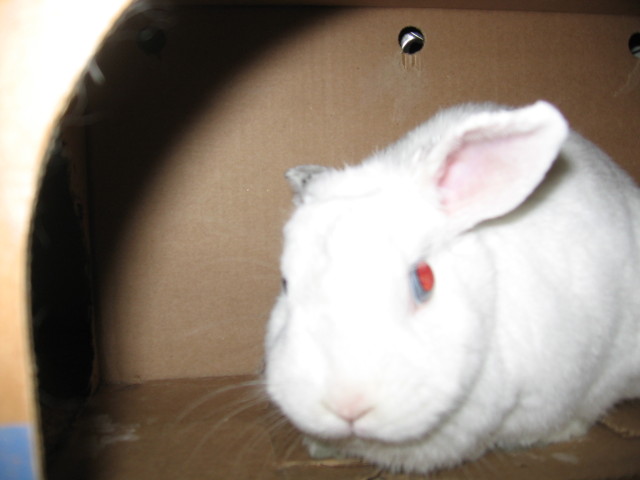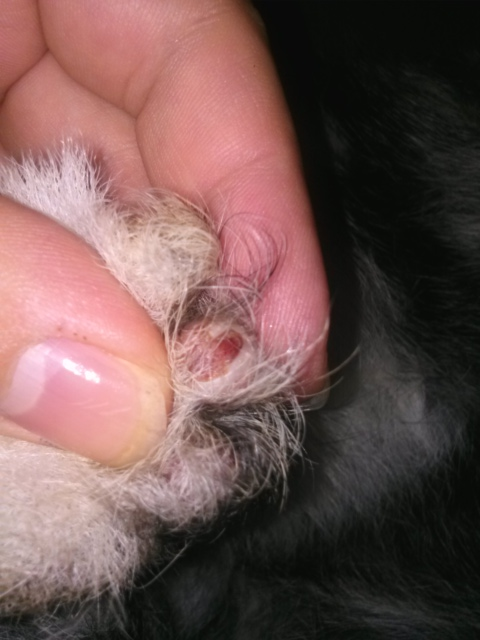QuestionQUESTION: Dana,
Upon seeing referrals on BinkyBunny, I am hoping for updated opinion on the eye situation of our seven month old Mini-Rex.
A month ago, bun had a clear runny eye and irritation. I rushed to our exotic vet who stained for abrasion or injury and did a duct flush. Neither yielded a source for irritation. I was sent home with topical anitibiotic and NSAID drops for 10 days. All issues resolved. A week after completing treatment, new irritation was noted. The iris appeared reddened, as did the whites of the eye with an irregular shaped pupil with constriction.
We visited a veterinary ophthalmologist. She noted a very tiny abscess in the iris and lens irritation and diagnosed it as anterior uveitis suspicious for E. Cuniculi or Paturella. We were sent home with corticosteroid drops for 2 weeks. We finished the two weeks yesterday and went for follow up. Redness has cleared and the abscess is smaller. So far, her intraoccular pressure is fairly normal with only a slight drop with the cortico-steroid use, so the glaucoma situation is being monitored. We are waiting for E.Cuniculi titers to return, but both the eye vet and our exotic vet feel this is the likely culprit as bun has none of the other typical pasturella symptoms. Additionally, there is a tiny cataract now formed from the inflammation. The recommendation is phaco-emulsification of the cataract where they could also possibly flush the abscess and oral meds for the protozoa.
The trouble I am finding is that our case was caught so much earlier than most case studies, I want to be sure we aren't racing into risky and expensive procedure and that other options have been weighed. Bun is functioning well, despite the annoyance of frequent drops. How quickly should we jump at a 3000 dollar cataract surgery for a teeny tiny cataract? Have you encountered cases of improvement once oral meds are started for the E. Cuniculi or with continued use of the eye drops?
We were told aspiration of the abscess could be an option, but with ours being so small, it may not be effective or well targeted. We have also been informed that she may be likely to have more eye issues as a result of cataract surgery. They also offered removal of the eye, which definitely is cheaper than cataract surgery but seems rash at this point. Or is it?
I requested the opportunity to monitor her eye and continue drops and start oral E. Cuniculi treatment and the vets have agreed, but seem skeptical. I feel pressured into an expensive procedure that seems to have very little documentation of efficacy for early diagnosed cases like ours. I am hoping you have some insight into early diagnosed cases of occular E.Cuniculi and treatment prognosis. Also, my personal bun mom question is are cataracts painful? Obviously I know her vision will degrade if the cataract continues to grow. Also, all this vet attention is very much stressing my young bunny who is almost terrified of us for 2 days after each vet visit. I worry surgery will be quite hard on her, so want to move forward with it only if it is our best option.
Lastly, we are also at odds as to how the eye previously cleared with the antibiotic and NSAID routine and isn't as responsive with the steriod. The eye vet has suggested reducing steroid use to twice per day and once per day with the NSAID rather than our current routine of three times a day steriod.
Any thoughts you have on treatment outcomes of early cases of occular E. Cuniculi are appreciated. So much info available to me is from rabbits with much more severe cases or is quite outdated.
Thanks,
Worried Mom Bee and Blinky bun Luna
ANSWER: Dear Bee,
In answer to your questions, here goes:
> How quickly should we jump at a 3000 dollar cataract surgery for a teeny tiny cataract?
NOT quickly, because...
> Also, my personal bun mom question is are cataracts painful?
No, cataracts are generally not painful or uncomfortable. If this were my rabbit, I would see little reason to have her undergo this procedure, because there is little to gain. The main problem with cataracts is the reduction in vision. If she becomes blind in only one eye, even less reason for expensive, invasive surgery. One-eyed rabbits do fine. If both eyes are affected, then lens removal will improve her vision somewhat, but she will not be able to focus. (Lens implants are not likely to be effective, as artificial lenses made for cats and dogs are the wrong shape for rabbits. I don't know of anyone manufacturing artificial lenses for rabbits yet. Though that doesn't mean they're not out there.)
That said, uveitis *is* painful. This would warrant continued treatment with NSAIDs (e.g., flurbiprofen ophthalmic drops) and antibiotic eye drops. (As an aside: Did the ophthalmologist prescribe atropine drops to help reduce pain by paralyzing intraocular muscular spasms? It really can help. Be aware that many rabbits produce an unusual enzyme, atropinase, that inactivates atropine. But atropine production varies among rabbits, and even those who produce it can be afforded some relief with atropine ophthalmic drops.)
On another note, I attended a talk at this past January's NAVC (North American Veterinary Conference) on this very topic. As it turns out, ophthalmic E. cuniculi is something a bunny acquires during embryo development or very early babyhood, and it generally does not spread to other parts of the body after that time. The eye is an immunologically privileged site: it has its own immune cells, and is relatively isolated (immunologically) from the rest of the body.
While it's not impossible that the parasite is already in other tissues (kidney, central nervous system), if there is no evidence of infection other than E. cuniculi-typical cataracts, then it might not be fruitful to treat with oral meds (e.g., ponazuril, fenbendazole). This isn't to say you should not treat for the parasite. Doing so will not be harmful (unless you're using albendazole, which is very risky), and it might help. It just also might not.
> we are also at odds as to how the eye previously cleared with the antibiotic and NSAID routine
> and isn't as responsive with the steriod. The eye vet has suggested reducing steroid use to
> twice per day and once per day with the NSAID rather than our current routine of three times
> a day steriod.
When you consider that corticosteroids suppress the immune response (that's why they reduce inflammation), it's not all that surprising that the condition would get better with NSAIDs and antibiotics, but not so much with corticosteroids.
I am always a bit mystified when physicians prescribe corticosteroids for treatment of an infection (in an area of the body other than the eye), because it just doesn't make sense to suppress the host's immune response when that's exactly what you need to fight the bacteria. All the antibiotics in the world will not completely kill off the bacteria: they are just an assistant to the host's immune system. So you don't want to suppress your best weapon!
The eye is a special case, though. It's likely that the ophthalmologist prescribed corticosteroids to reduce inflammation quickly, as inflammation of the uvea and other intraocular structures can cause permanent damage to the eye. In that sense, uveitis is an emergency, and the inflammation must be controlled. But you're kind of between a rock and a hard place: the corticosteroids will prevent the damage caused by inflammation, but it's also suppressing the immune system, and might make it harder to fight the infection causing the inflammation in the first place. gah!
If this were my rabbit, I would ask the vet if it might be possible/safe to stop the corticosteroid drops, and continue with NSAIDs and antibiotics until the iris infection is completely resolved. That could take several weeks, but that might be a way to have a longer-term solution. Ten days on the antibiotic drops might not have been enough to kill off all the bacteria causing the problem, and once the meds were removed, the survivors proliferated and re-established the abscess. :(
If you see a recurrence of serious inflammation when the steroids are stopped, then you should consult the vet immediately.
> Have you encountered cases of improvement once oral meds are started for the E. Cuniculi or with > continued use of the eye drops?
Not improvement of cataracts. Once the damage is done to the lens, it's done. And oral meds will probably not affect any E. cuniculi in the lens. I am not 100% sure that fenbendazole can't cross into the eye, but I don't think it can. Same for ponazuril.
So in summary, if this were my rabbit I would not opt for cataract removal. I would continue treating the problems that will respond to NSAID and antibiotic treatment (uveitis) and keep treating for at least two weeks after the problem appears to be gone. If the abscess recurs after that, you might ask about switching to a different antibiotic, or a combination (we've found that combining a fluoroquinolone (e.g., ofloxacin, ciprofloxacin drops) with an aminoglycoside (e.g., gentamicin, amikacin drops) can really work, as these two classes of antibiotics appear to work synergistically.
I hope some of this is helpful. I'm not second-guessing your vets. (And if you share any of this with them, please do so in a sensitive manner, since I'm just some stranger from the internet, and most vets hate that.) Just sharing what I know and hope it might help steer your bunny's treatment, if they think some of these ideas are reasonable.
Good luck,
Dana
---------- FOLLOW-UP ----------
QUESTION: Dana,
First, thank you so very much for your time! I cannot thank you enough. I am going to our primary exotic vet Monday and will speak with them. Our opthamologist vet is actually open to help, she is posting the same questions I have on many online forums for professionals.
As a mom, I just feel that a very expensive surgery that will be very stressful to boot is hard to justify after only a few weeks of trying with some promising improvement. Particularly, since the abcess, while visible is maybe 1 mm long. It is basically just a dark spot on her iris. Her pupil, while contricted by the cataract will open 2/3 of the way and will constrict with light appropriately. She is a happy house pet and is not exposed to super bright light and is in a secure area in the dark at night to minimize risk due to eye irritation and general bunny curiosity.
Right now we are on a combo of nsaid flurbiprofen and corticosteroid dexamethasone. I am so happy to hear you feel the antibiotic seems reasonable to consider reintroducing. I have been struggling to understand how an infection can clear if oral meds can't reach her eye.
Do you have a personal preference on which oral med? I am to head to the vet tomorrow to get them and I am unsure what med they chose. I do know they mentioned a risk to her bone marrow that will require monitoring via blood test.
Lastly, do you remember who presented the lecture you attended in case I can provide them for my vets to reach out to?
All of the frequent vet trips have been stressful for us but horrible for bun. She is young and we have only had her since January. She hates being held or picked up, let alone poked and annoyed and restrained at the vet. She is so skittish after appointments, it breaks my heart for her to be so nervous of even us for two days after each vet visit. And she is our first bunny, so I am trying so hard to do the right thing for her. Your experience is really appreciated and valuable. I would love to hug you!
Thank you again so much!
Bee
AnswerDear Bee
> I am so happy to hear you feel the antibiotic seems reasonable to consider reintroducing.
> I have been struggling to understand how an infection can clear if oral meds can't reach
> her eye.
I agree. I think ophthalmic antibiotic drops are really the way to go here. You deliver the meds right to the source, which is better than flooding her system with antibiotics, unnecessarily.
> Do you have a personal preference on which oral med? I am to head to the vet tomorrow to get
> them and I am unsure what med they chose. I do know they mentioned a risk to her bone marrow
> that will require monitoring via blood test.
If they are wanting to put her on albendazole, then I would strongly suggest you REFUSE that drug. It should never be used on rabbits, as there is a very real risk of idiosyncratic reaction that causes complete bone marrow failure. It is the most toxic of the benzamidazole drugs used to treat E. cuniculi, and I don't understand why any vets would use it when there are two far less toxic drugs in the same class, fenbendazole and oxibendazole, that may be even more effective against the parasite.
We have used fenbendazole in conjunction with ponazuril (Marquis) to treat suspected E. cuniculi (head tilt with no sign of ear infection) with excellent results. Our vets used both drugs together, each at 20m/kg once a day for 30 days.
We have never monitored blood values when using fenbendazole, and have yet to see an adverse reaction. I hope your vet is just being extra cautious in suggesting this constant bloodwork (stressful!), and doesn't just have financial motivations. :( But if the vet suggests albendazole: JUST SAY NO.
> Lastly, do you remember who presented the lecture you attended in case I can provide them
> for my vets to reach out to?
Dr. Carolyn Cray:
http://uhealthsystem.com/researchers/profile/2795
She can give your vets the complete rundown on what tests might be best to accurately diagnose what's going on with your bunny, and give them a better description of her research than I gave you in the previous email. She's terrific!
I hope this helps. Noserubs to the traumatized bunny, and healing thoughts for you!
Dana

 my bunny is urinating on the floor
Question
tucker bunny
i have a 5 year mini lop male tha
my bunny is urinating on the floor
Question
tucker bunny
i have a 5 year mini lop male tha
 breed and age of my bunny
Question
thumper
Hi how are you sorry for the bother bu
breed and age of my bunny
Question
thumper
Hi how are you sorry for the bother bu
 TMJ Osteomyelitis (e. cuniculi) or just TMJ & options
QuestionEarless Glenna
QUESTION: Hi Dana,
My re
TMJ Osteomyelitis (e. cuniculi) or just TMJ & options
QuestionEarless Glenna
QUESTION: Hi Dana,
My re
 Rabbt developing the flopsies
Question
Patty the rabbit
Hello!
My 7y.o. female rough
Rabbt developing the flopsies
Question
Patty the rabbit
Hello!
My 7y.o. female rough
 Very big problem with Rabbits nails
QuestionQUESTION: Hello, I am at a loss at to what is h
Very big problem with Rabbits nails
QuestionQUESTION: Hello, I am at a loss at to what is h